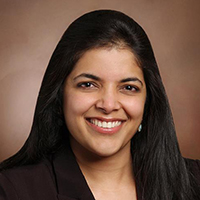Large B-cell lymphoma (LBCL) is one of the most aggressive lymphomas and accounts for about 30% of all lymphoma diagnoses.
For decades, the standard of care has been frontline chemotherapy, meaning it’s the first treatment given for the disease, which leads to cure in 40 to 50% of patients. For the remainder of patients – those who don’t respond to treatment or who initially respond but relapse within 12 months – the second-line treatment has been salvage chemotherapy followed by an autologous stem cell transplantation. Unfortunately, only a quarter of transplant-intended patients are able to achieve remission.
Lisocabtagene maraleucel, or liso-cel, has shown excellent efficacy and safety in patients as third-line therapy, including after failure of transplantation. Recently published research demonstrates that liso-cel is significantly superior to an autotransplant and is an effective second-line treatment for patients with LBCL who either didn’t respond to frontline chemotherapy or who responded but relapsed within 12 months.
“We consider this a huge success and a win for patients,” says Manali Kamdar, MD, University of Colorado Cancer Center member and lead author on the study. “At the end of the day, the goal is to get 100% cure, so this is an important step in our work to continue enhancing the efficacy of CAR T cell therapies and bring them more and more into frontline treatment settings.”
In June, the U.S. Food and Drug Administration approved using liso-cel for second-line treatment with LBCL patients who were not initially responsive to one prior treatment or who quickly relapsed. Kamdar cites this expedited approval process as a major victory for patients, as the study demonstrated significantly higher event-free survival rates among participants treated with liso-cel versus those who received standard-of-care salvage chemotherapy.
Part of a global study
The study was phase 3 of the global TRANSFORM trial, which was conducted at 47 sites in the United States, Europe, and Japan. The trial compared standard-of-care second-line therapy with liso-cel in LBCL patients age 18 to 75 who didn’t respond to frontline treatment or responded but relapsed within 12 months.
“CAR T made a big splash in the third-line setting, and it received FDA approval for third-line treatment, but to receive it a patient had to have failed two previous treatments,” Kamdar says. “Because the treatment proved to be very effective, we recognized an unmet in need in terms of bringing it forward as a second-line treatment.”
The 184 study participants were randomized into standard-of-care and liso-cel groups. Participants in the liso-cel group has almost three times the length of event-free survival as those in the standard-of-care group.
Event-free survival, or EFS, is the length of time after cancer treatment ends that a patient remains free of certain complications or events that the treatment was intended to prevent or delay. In the study, EFS for those in the liso-cel group was about 10 months, while EFS for those in the standard-of-care group was a median of 2.3 months.
Treatments emerge from clinical trials
Another encouraging finding that emerged from the research is that treatment-emergent adverse events were comparable between the two groups. “Unique CAR-T related toxicities were really low-grade in patients who received liso-cel,” Kamdar says. “Cytokine release happened in 49% of participants, but there was no grade 4 or grade 5 cytokine release syndrome. Only 4% of patients had grade 3 neurological events, and there were no grade 4 or grade 5 events.”
Kamdar adds that liso-cel is demonstrably superior to historical standard-of-care treatment and “it’s a very efficacious product, a very safe product, and we’re able to administer it in an outpatient setting,” Kamdar says. “Not only is this hugely important for patients, but it’s significant that the University of Colorado was able to be one of the leaders on this global study.”
The CU Cancer Center is emerging as a leader in CAR T cell therapies “and we’re actually manufacturing our own homegrown CARs here, with the goal of efficacy that is way higher than the existing construct,” Kamdar explains. “Cancer cells develop resistance and end up being smarter than the drug, so we’re working on ways to get ahead of the cancer cells so they can’t get to that point.”
This study emphasizes the importance of seeking care at an academic center and asking for information about clinical trials.
“For patients, it’s extremely important to keep the faith and to seek out these novel therapies, which emerge from clinical trials,” Kamdar says. “We’re eager to support patients and help them understand that they’re not guinea pigs, that studies aren’t designed to be ‘sugar pill’ vs. the drug anymore. Our most promising treatments are emerging because people are willing to participate in trials.”




